Recent Comments
- Chodpa on The Place where the Primordial Speaks
- Chodpa on The Cuckoo of Presence
- Afzar on Bodhidharma’s teacher, Prajnatara
- Vajragoni on Audiobook is released
- Scott on Audiobook is released
-
Recent Posts
Categories
- A Darkness Visible
- A Docetic Assessment
- A Mystical Odyssey through the Sagathakam
- AI Creations
- Akṣayamatinirdeśasūtra
- Akṣhobhya’s Pure Land
- Ālaya-vijñāna
- Anūnatvāpūrṇatvanirdeśaparivarta
- Ariyapariyesanā Sutta
- Ascending the Noble Mountain of Primordial Perfection
- Asceticism
- Ashtavakra Gita in Light of the Unborn
- Audiobook
- Bankei Zen
- Beyond the Ascent
- Beyond the Rainbow Body
- Black Dragon Eye Mandala
- Bodhicitta
- Buddhadharma
- Buddhism’s Black Holes
- Buddhist Anecdotes
- Buddhist Hells
- Buddhist Meditations on the Tarot
- Chuang-Tzu
- Contemporary Musings
- Ḍākiṇī
- Dāsbodh
- Dharmakaya Abbey
- Dharmakaya Stick
- Divine Revelation
- Doctrine of the Void
- Dust Contemplation
- Ekacitta: Advanced Studies in Dark Zen
- Entry into the Dharmadhātu
- Eremitical Dhyani Meditations
- Exploring the Book of Revelation
- Gnostikos
- Hsin Hsin Ming
- Journey to the Center of the Mind
- Karma and Rebirth
- Korean Sŏn
- Kulayarāja Tantra—The Motherly Buddha
- Little Office of Our Lady of the Void
- LSD and Psychedelic Buddhism
- Māṇḍukya Kārikā
- Mañjuśrī Teaches Prajñāpāramitā
- Māra and Satan
- Meister Eckhart
- Mud and Water: Bassui Zen
- Mystagogia
- Nirvana
- Notes from the Iron Stupa
- Nothingness in Nāgārjuna and John of the Cross
- Obscure Religious Cults
- Preparation for the Afterlife
- Primordial Qigong
- Reflections on the Saṃdhinirmocana Sūtra
- Spirituality
- Springtime with Tozen
- Terma: A Mind Film by Vajragoni
- The Afterglow
- The Awakening of Faith
- The Bhagavad Gita
- The Book of Bodhi
- The Cloud of Unknowing in Light of the Unborn
- The Diamond Sutra
- The Divine Ātman
- The Divine Liturgy of Vajrasattva
- The Doctrine of Awakening
- The Dragon Mind of Zen Tarot
- The Elucidation of Consciousness
- The Experience of No-Self
- The Great Perfection of the Unborn Mind: A Book of Privy Counseling
- The Heart Sutra
- The Hermit's Den
- The Khaggavisāṇa Sutta: A Rhinoceros Horn
- The Lankavatara Sutra
- The Lankavatarian Book of the Dead
- The Lion's Roar of Queen Śrīmālā
- The Lotus Sutra
- The Mahāparinirvāṇasūtra
- The Naga Chronicles
- The Platform Sutra
- The Ratnagotravibhāgaśāstra
- The School of the Spirit
- The Secret Golden Light of the Unborn
- The Soul
- The Śūrańgama Sūtra
- The Sutra of Primordial Enlightenment
- The Tathāgatagarbhatārā Tantra
- The Udāna
- The Unborn Mind Mythos
- The Unborn Mind Sessions
- The Unborn Odyssey: A Novel
- The Vajrasamādhi Sutra
- The Vimalakirti Sutra
- The Yogasūtras of Patañjali
- The Zen Teaching of Bodhidharma
- The Zen Teaching of Instantaneous Awakening
- The Zen Teachings of Huang Po
- Theologia Mystica
- Tozen Teaching
- Tsung-mi: An Intimate Study
- Unborn I Ching
- Unborn Light Reiki
- Uncategorized
- Vasubandhu and the Absolute
- Wisdom from the Masters
- Wordsworth and Zen
- Yoga of the Manomayakāya
- Zen
- Zuowang
Archives
- October 2024
- August 2024
- February 2024
- January 2024
- December 2023
- November 2023
- October 2023
- September 2023
- August 2023
- July 2023
- June 2023
- May 2023
- April 2023
- March 2023
- February 2023
- January 2023
- December 2022
- November 2022
- October 2022
- September 2022
- August 2022
- May 2022
- April 2022
- March 2022
- February 2022
- January 2022
- December 2021
- November 2021
- October 2021
- September 2021
- August 2021
- May 2021
- April 2021
- March 2021
- February 2021
- January 2021
- December 2020
- November 2020
- October 2020
- September 2020
- August 2020
- May 2020
- April 2020
- March 2020
- February 2020
- January 2020
- December 2019
- November 2019
- October 2019
- September 2019
- August 2019
- June 2019
- February 2019
- January 2019
- December 2018
- October 2018
- August 2018
- April 2018
- March 2018
- February 2018
- January 2018
- December 2017
- November 2017
- October 2017
- September 2017
- August 2017
- May 2017
- April 2017
- March 2017
- February 2017
- January 2017
- December 2016
- November 2016
- October 2016
- September 2016
- August 2016
- July 2016
- May 2016
- April 2016
- March 2016
- February 2016
- January 2016
- December 2015
- November 2015
- October 2015
- September 2015
- August 2015
- July 2015
- June 2015
- May 2015
- April 2015
- March 2015
- February 2015
- January 2015
- December 2014
- November 2014
- October 2014
- September 2014
- August 2014
- May 2014
- April 2014
- March 2014
- February 2014
- January 2014
- December 2013
- November 2013
- October 2013
- September 2013
- August 2013
- May 2013
- April 2013
- March 2013
- February 2013
- January 2013
- December 2012
- November 2012
- October 2012
- September 2012
- August 2012
- May 2012
- April 2012
- March 2012
- February 2012
- January 2012
- December 2011
- November 2011
- October 2011
Meta
Tag Archives: dharmadhatu
Maitreya’s Tower

The Gandavyūha-sūtra, which is a segment of the expansive and illustrious Avataṃsaka Sūtra, narrates an allegorical journey undertaken by a “son of good family” named Sudhana. The esteemed Bodhisattva Mañjuśrī identifies him amidst a multitude of worshipers as an individual who possesses the spiritual readiness to commence the final phase of the journey toward Enlightenment. The Great Bodhisattva commissions him to embark on a pilgrimage to meet over fifty Good Friends, or kalyānamitras, who serve as spiritual guides, to seek their guidance in the Conduct of the Bodhisattva. These sagacious mentors hail from diverse backgrounds, including a notable representation of women and non-Buddhists.
Posted in AI Creations, Buddhadharma
Tagged dharmadhatu, Gandavyūha-sūtra, kalyānamitras, Maitreya, Sudhana
Leave a comment
The Puppeteer
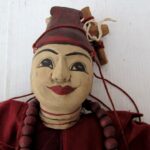
“Wise Protector, a wooden puppet strung up somewhere can give a variety of performances, such as walking, prancing, jumping, throwing, playing, and dancing. What do you think? By whose power can the wooden puppet do so?”
The Shining Ones
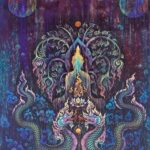
Chapter: 1, Sub-Chapter: 4
Stuck in Karmadhatu
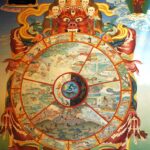
In reference to the Bodhichild last time we met, what will happen to me once it’s activated?
One may perhaps ask what’s supposed to happen to “my personality”, once the Bodhichild takes precedence over former attachments and desires. In actuality nothing is supposed to happen. There is no sudden Big Mind transformation that supersedes and eliminates one’s former way of addressing the world, i.e. through one’s “little mind”. Big versus little is merely another discriminatory attempt to justify the actions of mind’s outflows which imaginatively attempt to create something superior over something inferior, but in essence there is nothing to overcome. The only action that is necessary is acceptance. Acceptance of the hard core realization that your present imagined journey here has been self-inflicted and no imagined one or no imagined anything else is to blame for it.
Pleasurable Prajñāpāramitā
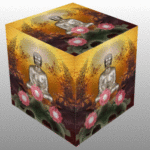
Pleasurable Prajñāpāramitā ushers-in a boundless Buddha-realm that is devoid of all contingent sentimentalities such as sentient beings who bake pies infused with discriminatory ingredients that never satisfies the oversaturated diet of superfluous notions like samsara or nirvana. Thus nothing is neither gained nor lost. The herald of such a no-nonsense realm is the Cittadhatu ennobled with the Element of Truth thus ending all habitual vicissitudes of a once diseased consciousness that labored endlessly in rotten fields of no-good merit. This herald’s Queen is the Element of Perfected Transfiguration who gives birth to the Clear-Light Child whose tabernacle is the Supreme Buddhadharma—home of the exalted Prince of the Tathagatas.
Posted in The Afterglow
Tagged dharmadhatu, Element of Truth, inconceivable samādhi, Manjusri, prajnaparamita
Leave a comment
The Central Vigor
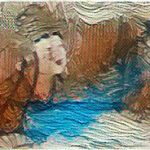
4. The Central Vigor
Then the [Supreme Source], mind of perfect purity, gave the following talk about the Reality of the names [given] to Her own being.
Bodhisattva of Universal Vision
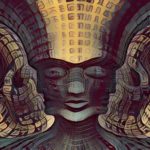
Then the Bodhisattva of Universal Vision arose from his seat in the sacred assembly, bowed and then prostrated himself at the feet of the Tathagata and then circumambulated about him three times to the right. He then knelt down and with hands clasped in a manner depicting sublime devotion, invoked the Blessed One.
Posted in The Sutra of Primordial Enlightenment
Tagged Bodhisattva of Universal Vision, dharmadhatu, eighteen exclusive attributes of the Buddha, eighteen realms, eighty-four thousand dharani doors, four kinds of fearlessness, four unhindered wisdoms, Mani-Pearl, Right Contemplation, Samatha, ten powers, thirty-seven aids to enlightenment, twelve entrances, twenty-five existences
Leave a comment
Children of Light and Darkness

Our present age can be likened to one of the final chapters of the Kali Yuga, or an age when the spirit of darkness reigns free and unhindered. The children of this dark realm are born into what is described in the Lankavatarian Book of the Dead as inhabitants of the Karmadhatu:
Synonyms of the Absolute

Friedmann’s translation:
A synonym makes clear that there are different names for the same-thing.
Because it defines the meaning of [the word of which it is] a synonym, it is called synonym…
Summarily the synonyms of the Absolute are:
Tathatā: The Absolute Essence; Suchness.
Bhūtakoṭi: The Limit of Reality; The Absolute Point of Existence.
Animitta: Deprived of Characteristics; The Formless.
Paramārthā: the Absolute, the Ultimate Reality.
Dharmadhātu: The Unique Absolute; the Ultimate cause of
the elements; Realm of Ideas.
Posted in Vasubandhu and the Absolute
Tagged Animitta, āśrayāparāvṛtti, Bhūtakoṭi, dharmadhatu, paramartha, tathata, trilakṣaṇa
Leave a comment
Hwadu
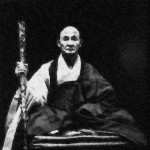
Chinul’s last “great awakening” occurred at Sangmuju am, near the top of the Mount Chiri—here, [suddenly] he was taken by reading Ta-hui Tsung-kao’s rendering of the hua-t’ou (K. hwadu) method:
